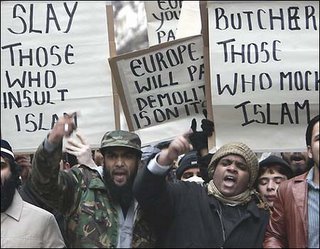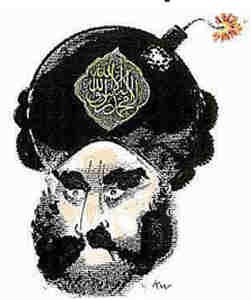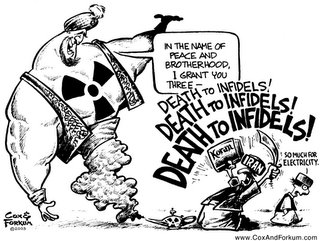
Vladimir Putin, supreme commander of Russia, has apparently been making overtures to Hamas. At a Kremlin
news conference he invited them to Moscow for "talks". Later in the speech he pointed out that, “The Russian Foreign Ministry has never regarded Hamas as a terrorist organization.” If Putin wants to cozy up to an organization that advocates the annihilation of a race of people that’s his business. What I am more disturbed by is his characterization of the Hamas election victory as, “A big blow to American efforts in the Middle East, a very serious blow”. What does he mean when he says “American efforts”? Why does he explicitly say "American" efforts and not "The efforts of the International Community"? Does he not share our goal of bringing peace to the region or is he implying that we have some dastardly ulterior motive? Like many critics of President Bush's Middle Eastern policy, I believe he’s confusing our desire to bring democracy to the Middle East with our appreciation of having “friendly” governments in the region. This comment by Putin is just the latest example of what seems to be a concerted effort by some of our opponents, political and otherwise, to misinterpret our intentions in the Middle East. To start, a distinction has to made between the desire to bring democracy to the middle east and the desire to have a non terrorist (or terrorist friendly) government holding power in the region. Lately, our rhetorical enemies have been trying to muddle the two issues in an attempt to somehow show that America's policy in the region is flawed. For whatever reason, they fail to grasp the fact that, while we
are seeking to bring democracy to the Middle East, it does not however mean that we will be hand picking the governments that may come to power. Moreover, it
is possible to be in favor of promoting the advancement of democracy in the Middle East while at the same time not being thrilled with the results. Our main goal is: democracy, in and of itself. If the government that the people elect is reasonable (you know, like not having a stated policy promoting genocide) and/or “friendly” to our interests that would be a desirable result for sure. However, it would miss the point of democracy if we were to install the government of our choosing and therefore we would never have any part of it. The Bush doctrine on this is clear and straightforward:
For the most part, democratic nations don’t attack each other in anger. Therefore, if we can effect the advancement of democracy in a turbulent region of the world, then the population of that region would be more inclined towards peace. Nowhere in the Bush doctrine does it say, “We will allow the people to vote, but if we don’t like the results than we reserve the right to install who we want.”
This discussion is also very relevant to what is occurring in Iraq. The vultures waiting in the wings, who want to see Bush fail in Iraq are getting ready to use, in their insidious arsenal, the fallacious idea that, if a non secular or “unfriendly” government does come to power in Iraq then Aha…Bush has failed. In reality, one has almost nothing to do with the other. In Fact, if an “undesirable” result
does occur in a fledgling democracy it actually lends credence to the Bush Doctrine. It proves that America is genuine in its simple desire to bring democracy to the region, period. We don’t get to determine the results. That we helped bring a degree of democracy to whatever given country is enough.
If a population elects leaders who are corrupt, inept, or war-like then they will have to deal with the ramifications that will inevitably follow. They will have to learn the hard way, through additional years of instability and bloodshed most likely. It’s a form of political “growing pains” because after all, democracy itself is always a work in progress. For example, I don't believe that the people of France enjoyed the "
Reign Of Terror" which followed the French Revolution but it
was part of their transitional period between absolutism and democracy. The Riegn Of Terror was an awful and bloody period but because it occured does not mean that the people of France, ultimately, are not better served by being able to enjoy the benefits of a democratic society.
Some anti-Bush socio-political ”experts” point to this fact that, in some cases, a country becomes more violent, initially, after democracy is realized and then they conclude, "Aha…Democracy is not desirable." This analysis misses the big picture. That a democracy may be more violent initially than a previous form of government does not overrule the idea that, in the long run, democracy is more beneficial to a population than any other form of government. Hence, the Bush Doctrine in the Middle East is a worthwhile approach and is not rendered invalid or flawed if the results of a given election are not to our liking.
 After some negotiations and possible modifications of this deal I believe it will go through. If proper oversight is applied, coupled with the obvious flexibility that the company itself is exhibiting in order to allay the American population's security concerns, then this economic deal will go forward. (Check the comments section of this post for a more comprehensive overview of the situation which also, is an anaylsis that I agreee with.)
After some negotiations and possible modifications of this deal I believe it will go through. If proper oversight is applied, coupled with the obvious flexibility that the company itself is exhibiting in order to allay the American population's security concerns, then this economic deal will go forward. (Check the comments section of this post for a more comprehensive overview of the situation which also, is an anaylsis that I agreee with.)









